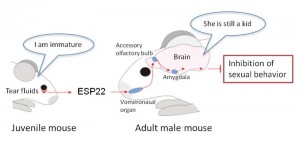Discovery of a juvenile mouse pheromone that inhibits sexual behavior Pheromone signals for sexual immaturity

In mice, social behavior is driven by pheromones that encode information related to age, sex, and physiological state. While mice exhibit different social behaviors towards adults, juveniles, and neonates such that adult male mice never initiate copulation with immature females, sensory cues that enable specific recognition of juvenile mice are unknown. The Touhara group and co-workers in the University of Tokyo in collaboration with groups in Harvard University and RWTH Aachen University discovered a juvenile pheromone produced by young mice before puberty, termed exocrine-gland secreting peptide 22 (ESP22). ESP22 is a 10 kDa protein that is secreted from the lacrimal gland and released into tears of 2-3 week old mice. ESP22 activates high affinity sensory neurons in the vomeronasal organ, and downstream limbic neurons in the medial amygdala. Recombinant ESP22, painted on mice, exerts a powerful inhibitory effect on adult male mating behavior.

© Kazushige Touhara, ESP22 released from sexually immature young mice inhibits sexual behavior of adult male mice.
Sexual responses towards ESP22-deficient juveniles are suppressed by ESP22 painting. These results suggest that ESP22 is a pheromone of sexually immature mice that inhibit sexual behavior towards young. In addition to deepening our understanding of mice reproductive strategies, these findings provide insights into strategies for controlling the mouse population in urban areas.
Press release (Japanese)
Paper
David M. Ferrero, Lisa M. Moeller, Takuya Osakada, Nao Horio, Qian Li, Dheeraj S. Roy, Annika Cichy, Marc Spehr, Kazushige Touhara, and Stephen D. Liberles,
“A juvenile mouse pheromone inhibits sexual behavior through the vomeronasal system”,
Nature Online Edition: 2013/10/2 (Japan time), doi: 10.1038/nature12579.
Article link
Links
Graduate School of Agricultural and Life Sciences
Department of Applied Biological Chemistry, Graduate School of Agricultural and Life Sciences







